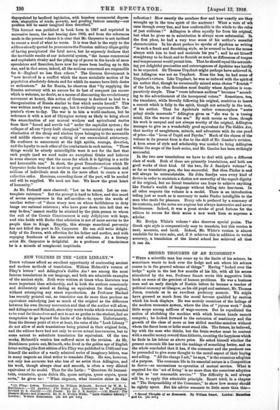SECOND THOUGHTS OF AN ECONOMIST.*
" WHEN a scientific man has come up to the limits of his science, he sometimes wants to look over the hedge and ask where his science comes in in the general scheme of things." Having " looked over the hedge " again in the last few months of his life, with all his senses stimulated by the war, Professor Smart wrote this suggestive little book on some of the greatest of human problems. He was a business man and an early disciple of Ruskin before he became a teacher of political economy at Glasgow, as his old pupil and assistant, Mr. Thomas Jones, reminds us in an excellent prefatory memoir. We might have guessed as much from the moral fervour qualified by caution which his book displays. He was acutely conscious of the failings of the modern economic system, where the idea of " joyous work " finds little scope among millions of wage-earners. But ho repudiated the notion of abolishing the machine with which human hands cannot compete ; he looked forward to the extension of machinery and the growth of the class of more or less skilled machine-minders without whom the finest loom or lathe must stand idle. The future, he believed, lay with the man who thinks, but the brain-worker must be content with a smaller money reward than hitherto, counting the happiness which he finds In his labour as above price. Ho asked himself whether the present economic life has not the makings of something better, and on the whole concluded that It has, if the consumer and the producer can be persuaded to give some thought to the moral aspect of their buying and selling. " All the change I ask," ho says," is the conscious adoption of a purpose. The economic life in its essential nature is a Competition to Serve—an unconscious co-operation of mutual service. What is required for the art of living' is no more than the conscious adoption of this as our reasonable service.' " The difficulty is, and always will be, to apply this admirable principle. Smart tried, in a chapter on " The Responsibility of the Consumer," to show how money should be rightly spent. But his advice amounts to little more than this- • Second Thoughts of an Economist. By William Smart. London: Macralllase and Co. Os. net,]
that selfish indulgence is bad, that waste of all kinds is bad, and that the miser is less of a public danger than the spendthrift because his money at the bank can be used to increase the stock of capital that is at the service of commerce and industry, or, as ncw, of the State for defence. In war time his plea for thrift is by no means superfluous ; it will need repeating with greater emphasis still when peace comes.































 Previous page
Previous page